
Do you know the most essential yet often overlooked part of an SEO strategy? No, it is not keyword research but competitor analysis. The reason you are doing search engine optimization is to outrank your or your client’s competitors.
Can you do that without knowing how your competitors are doing in terms of traffic and backlinks? You already know the answer, and that’s why you are here looking for top competitor analysis tools.
Because deciphering your competitor’s strategies is important to gain an edge over them, having the right tool can make a major difference. In this article, you will find an unbiased list of the top 9 SEO competitor analysis tools that professional SEOs recommend.
Competitor analysis is an indispensable part of every successful SEO strategy, and for that, you need a tool. Let’s explore some reasons why having an analysis tool can be a game changer.
These tools offer a sneak peek into your competitors’ strategies, revealing the keywords they target, their content approach, and backlink strategies. Understanding these insights helps you shape a more informed and strategic SEO plan for your site.
By analyzing your competitors’ successes and failures, you gain a clearer understanding of what works in your industry. Recognizing their strengths allows you to emulate or innovate while identifying their gaps presents opportunities for your growth.
Comparing your performance metrics against competitors gives context to your SEO efforts. It helps set realistic goals and benchmarks for improvement, ensuring that you’re not just keeping up but aiming to surpass the competition.
Discovering untapped keywords, niche markets, or content gaps that competitors haven’t addressed can be a goldmine. These tools highlight areas where you can capitalize and differentiate yourself in the market.
In the dynamic world of SEO, staying updated is crucial. Competitor analysis tools keep you abreast of changes in your industry, from shifts in search trends to algorithm updates, allowing you to adapt your strategy proactively.
Running an SEO campaign without a competitor analysis tool is similar to embarking on a quest without a map or compass, you will be blindly navigating through uncharted territory, hoping to reach your destination unscathed.
So, let’s have a look at the best nine tools that can amp up your SEO game.
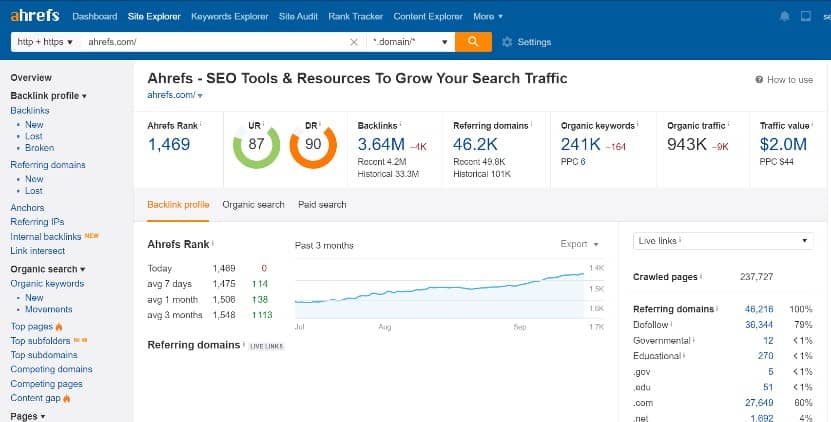
The SERP checker tool by Ahrefs is one of the best SEO competitor analysis tools available in the market. With both free and paid options, Ahrefs offers a comprehensive list of functionalities that can make your competition analysis in-depth and intuitive.
When you search a competitor’s URL with a specific domain keyword, it generates a SERP overview with page and domain rating metrics. These metrics include volume and source of backlinks, domain rating, referring domains, traffic, and keyword value (in dollars).
Ahrefs also offers a content gap analysis as part of its SEO competitor report to help you plan relevant and impactful SEO content for your website, with the highest probability of ranking improvement.
| Pros | Cons |
| Renowned for its extensive backlink database, offering detailed insights into backlink profiles which is crucial for understanding a website’s authority and link-building strategies. | Relatively expensive, especially for small businesses |
| Provides in-depth keyword research capabilities, including keyword suggestions, search volume, keyword difficulty, and ranking history. | Primarily focuses on external metrics like backlinks and keywords, and while it offers a site audit tool, it may not be as comprehensive in other areas of technical SEO. |
| Excellent choice for competitive analysis, allowing users to track their competitors’ SEO strategies, including their backlinks, keyword rankings, and content performance. | |
| The platform has a clean, intuitive interface that is easy to navigate, making it accessible for users of all expertise levels. |
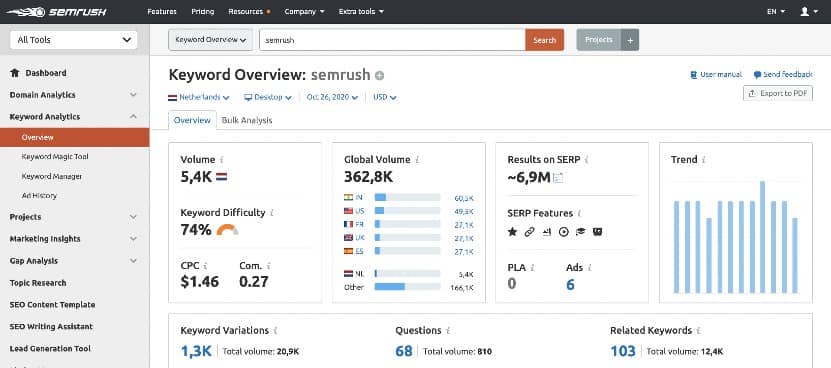
SEMrush is a versatile SEO and marketing tool that offers keyword research, site audit, and backlink analysis functionalities in addition to detailed SEO competitor analysis. Its user-friendly SERP analysis tool is easy to learn and use for any domain.
The dynamic ‘Tooltip’ feature lets you understand every link, button, and section so that you can create your specific conditions for performing SEO competitive analysis.
When you search a domain-specific keyword using SEMrush, the tool generates a list of the top 100 Google results and assigns an authority score to each URL. Alternatively, you can directly search a competitor’s site by entering their URL. Key metrics of each URL are already listed on the tool. You can perform advanced SEO competitive analysis through:
| Pros | Cons |
| Allows users to track competitors’ keyword rankings, backlink profiles, and digital marketing strategies | The interface can sometimes feel cluttered, which might affect user experience, especially for those who prefer a more streamlined layout. |
| Includes a suite of content marketing tools, aiding in content creation and optimization, topic research, and measuring content performance. | Pricing is on the higher side, which might be a barrier for small businesses |
| Helps in identifying and fixing problems that might be affecting a website’s search engine performance. | |
| Backlink management and analysis help you with comprehensive link-building to outrank the competitors. |
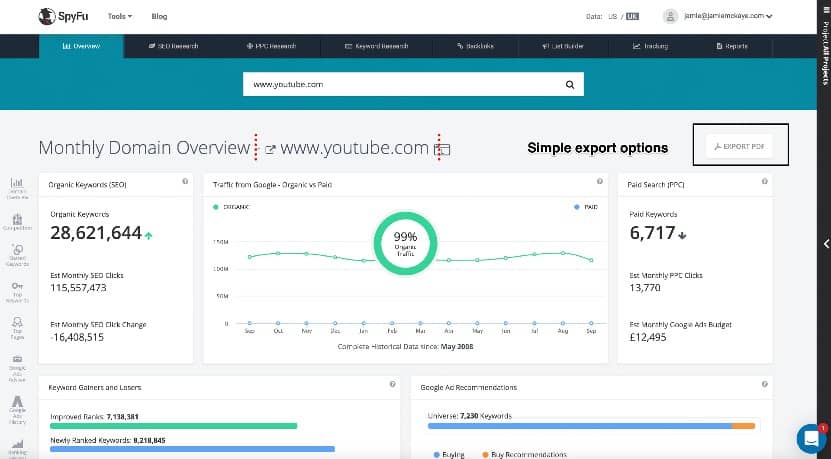
If research is not your strong suit and you would instead find an SEO competitor analysis tool that does all the work, then SpyFu can be a good fit. The SERP analysis tool of SpyFu provides unique analytics like the ranking difficulty and rank change of any competitor website over a given period.
The tool also indicates the number of .gov, .edu, and homepages that are in the top 100 search results. This makes it easier to screen relevant competitor content and adjust your SEO strategy accordingly.
SpyFu also has a backlink research feature that lists the strongest forum backlinks for any keyword and catalogs all the pages that link back to your competitors’ sites.
| Pros | Cons |
| Offers detailed insights into competitors’ strategies, particularly in PPC and SEO. | Users have found the backlink analysis feature less intuitive compared to other tools. |
| Robust keyword research tool, providing metrics like monthly volume, difficulty rating, and mobile/desktop traffic share. | Some users reported concerns over the accuracy of data for certain competitors. |
| Includes features like Kombat and PPC Keywords. | |
| Provides in-depth SEO and PPC reports and allows tracking of keyword rankings and outreach campaigns. |
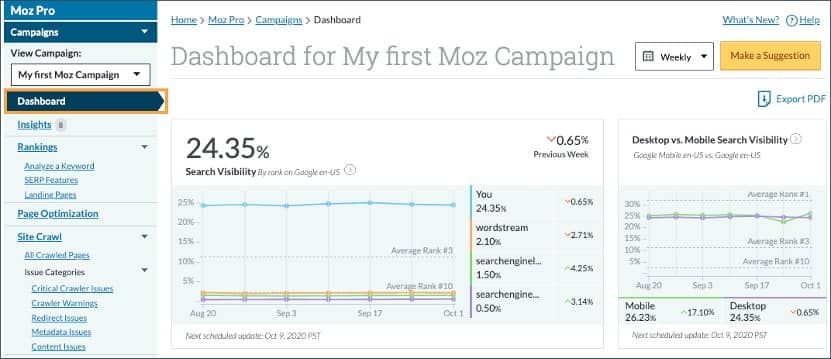
Moz is an all-in-one digital marketing tool that provides powerful SEO competitor analysis and insights across domains. The domain authority metric was originally coined by Moz and indicates how likely your or your competitor’s website will rank on SERPs.
Moz employs a series of metrics to compare URLs and generate custom analytic reports to guide your SEO and content strategy. Like the other tools, you can directly search a competitor’s URL with Moz or perform keyword research to find top-ranking competitors in your domain.
It also conducts site crawls to determine content gaps, tracks and updates SERP rankings weekly, and performs backlink research.
| Pros | Cons |
| Effective SEO rank tracking helps monitor search engine results pages over time. | The tool has a lot of features, which can be overwhelming to manage and require robust training. |
| Provides robust tools for keyword research and competitor analysis. | Capabilities in local SEO and social SEO tracking are somewhat limited compared to its other features. |
| Offers features for tracking and managing backlinks. | |
| Helps in identifying and resolving potential issues on websites. |
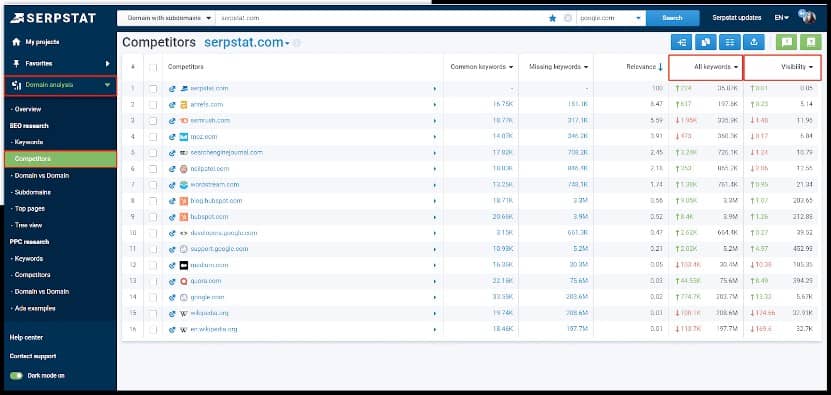
If you are not willing to spend a fortune on tools like SEMrush and Ahrefs, you can go for SerpStat, which is a cheaper alternative. While the tool is easy on your wallet, it does not offer a lot of features like its competitors.
The best feature is the “Tree View,” which lets you see your competitor’s top-ranking web pages and all the semantic and primary keywords they are using to rank in the SERPs.
In terms of user-friendliness, Serpstat scores full marks, as all you need to do is paste your competitor’s URL, and you can get essential insights about them.
| Pros | Cons |
| Provides detailed site audits to identify SEO issues. | Some users noted discrepancies in metrics when compared to other tools. |
| Effective backlink management helps track and manage backlinks efficiently. | Inconsistencies in support, and it is not as good as the competitors. |
| Reliable SERP ranking tracking helps accurately track a website’s positions in search engine results. | |
| Analyzes website positions against competitors and displays precise results. |
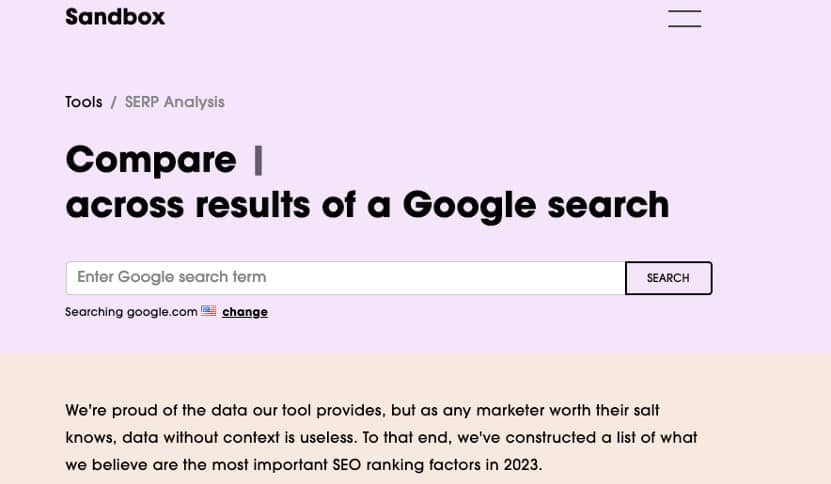
Next on the list is a SERP analysis tool that gets you the data of top-ranking competitors for a specific keyword. Besides the regular information, Sandboxweb.io gives you details regarding schema types, word counts, and Core Web Vitals, so creating an outranking strategy becomes convenient.
When you click on each competitor in the SERP, the tool displays more details. Like SEMrush, Sandboxweb.io also offers a free version, and you can search for 10 keywords per month.
Although the data is limited, this competitor analysis tool is good for quick results.
| Pros | Cons |
| The website interface is easy to navigate, even for beginners. | Not suitable for big-shot SEO agencies. |
| Analyzes competitors’ sites for all essential ranking factors such as content and site speed. | The free version only lets you search for 10 keywords per month. |
| Available to use in multiple languages. | |
| The reports generated by this tool are highly detailed. |
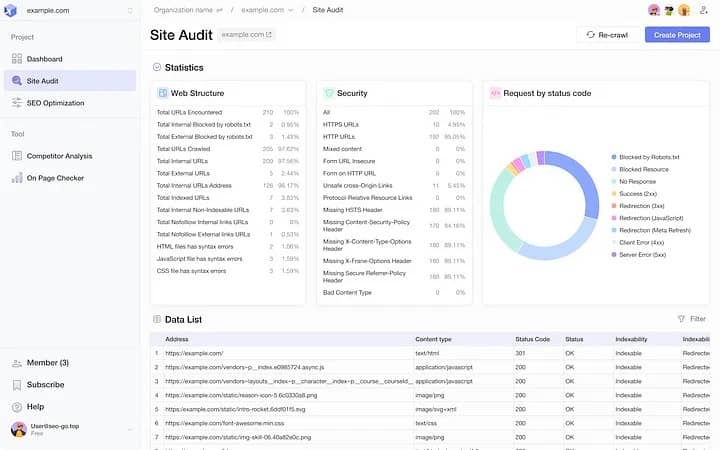
Screaming Frog has established itself as an indispensable tool in the SEO toolkit primarily because of its depth and comprehensiveness in website crawling and auditing. Many SEO marketers praise it for its ability to quickly and efficiently scan large websites, providing detailed insights into essential SEO elements like URLs, page titles, meta descriptions, and response codes.
This level of detail makes Screaming Frog an excellent tool for identifying technical SEO issues and for understanding the structure of both your own and competitors’ websites. However, unlike SEMrush and Ahrefs, this SEO competitor analysis tool has a learning curve.
Another potential drawback is its resource intensity. The desktop application can be demanding on computer resources, especially when crawling large websites.
Despite these limitations, its strengths in providing comprehensive, customizable, and detailed SEO data make it a tool worth considering for anyone serious about SEO.
| Pros | Cons |
| Offers thorough crawling capabilities, allowing users to analyze every aspect of a website’s SEO, including URLs, meta tags, response codes, and more. | The free version has limitations on the number of pages it can crawl |
| Users can tailor crawls to focus on specific SEO elements, making it an adaptable tool for various SEO tasks. | Being a desktop application, it needs a powerful system. |
| Provides detailed reports, which are invaluable for diagnosing technical SEO issues and strategizing improvements. | |
| Ideal for large websites, as it can handle extensive data without compromising on speed or efficiency. |
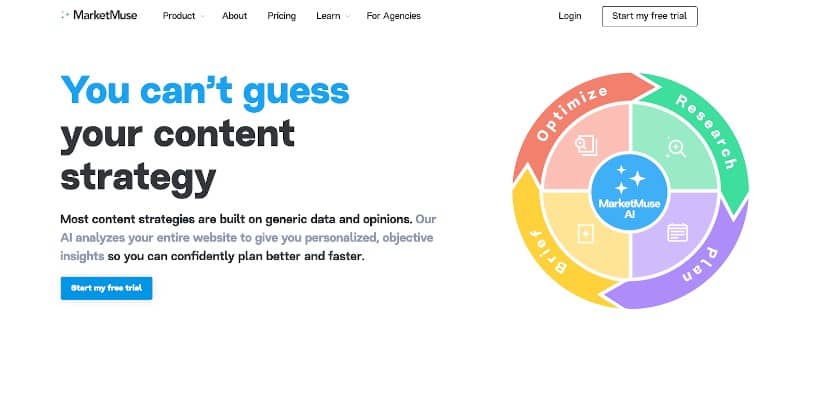
MarketMuse stands out with its advanced AI technology, which offers deep content analysis. This feature is crucial for understanding how your content stacks up against competitors in terms of depth, relevance, and quality.
One of MarketMuse’s notable strengths is its ability to identify content gaps in comparison to competitors. This insight allows users to pinpoint areas where they can improve or expand their content to outrank competitors.
The platform offers an intuitive and user-friendly interface, making it easier for users to navigate and interpret the data, a significant advantage for those new to SEO competitor analysis.
While excellent for content analysis and strategy, this tool is not designed for in-depth technical SEO analysis. As it relies on AI too heavily, the recommendations are sometimes overly optimized and difficult to trust.
If you need a tool that helps you break down your competitor’s strategy and aids in developing a robust content strategy, then I recommend trying MarketMuse.
| Pros | Cons |
| Helps identify content gaps and opportunities, helping users to understand areas where they can outperform competitors. | The tool can be expensive, particularly for small businesses or individual bloggers, making it less accessible for those on a tight budget. |
| Features a user-friendly interface, making it accessible for both beginners and seasoned SEO professionals. | Primarily targets content optimization, with less emphasis on technical SEO aspects. |
| Assists in developing a robust content strategy, guiding users on topics, structure, and SEO best practices. | |
| Creates creating high-quality, relevant content that aligns with search engine algorithms and user intent. |
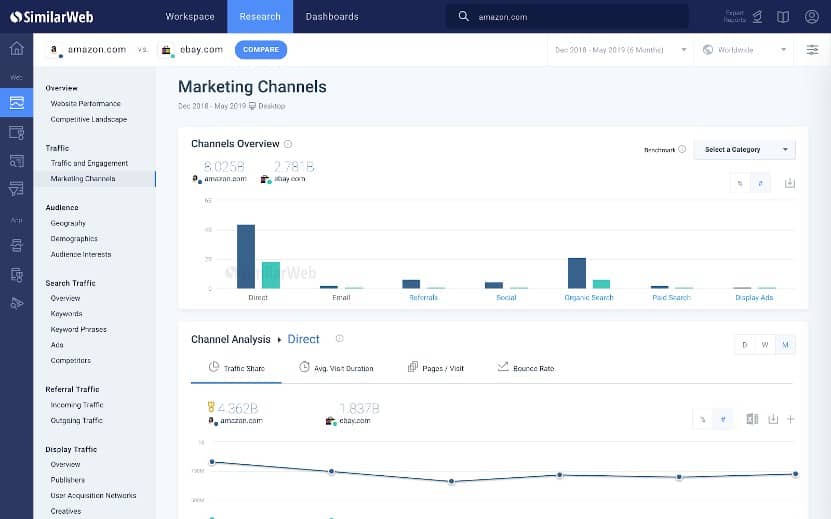
SimilarWeb is a holistic SEO competitor analysis tool that goes beyond SEO competitive analysis. In addition to standard comparative metrics like traffic and keyword density,
The SEO competitor analysis tool also provides insights like audience demographics and geographical traffic share for your competitors’ websites.
Traffic statistics can be compared for two or more competitors by simply adding their respective URLs. You can also use the advanced features of SimilarWeb to determine traffic sources of your top competitors, compare their market share, and utilize those insights to improve your content.
| Pros | Cons |
| Extensive data coverage, which is invaluable for market analysis and competitor research | There can be fluctuations in the accuracy of data, influenced by the sources and algorithms used. |
| Provides detailed insights into competitors, including their traffic sources, audience metrics, and keyword performance | While it offers audience insights, more granular demographic data could enhance its usefulness. |
| Offers robust tools for keyword research, helping in identifying traffic-generating keywords and understanding audience interests. | |
| Suitable for comparing a website’s performance against industry standards. |
Every SEO competitor analysis tool is different, some offer accurate keyword insights, while others offer excellent details about the backlinks. Below are some factors you must keep in mind when investing in these tools.
Ensure the tool provides comprehensive and accurate data. Look for tools that cover a wide range of competitors and gather data from multiple sources to offer a holistic view of the competitive landscape.
Assess the tool’s features and functionalities. Look for capabilities such as keyword analysis, backlink profiling, content gap identification, rank tracking, and trend analysis. The more diverse and in-depth the analysis options, the better insights you can gather.
A user-friendly interface is essential for efficient navigation and data interpretation. Opt for tools that present data in a clear, organized, and visually appealing manner, making it easier to derive actionable insights.
Go for an analysis tool that allows customization based on your specific needs. The ability to create custom reports, set preferences, and adjust parameters ensures that the tool aligns with your unique SEO goals and strategies.
Check if the tool allows seamless integration with other SEO or analytics platforms. Additionally, the ability to export data in various formats (CSV, PDF, etc.) is beneficial for further analysis or sharing insights with stakeholders.
Evaluate the accuracy of metrics provided by the tool. Metrics like domain authority, keyword difficulty, and organic traffic estimations should be reliable and consistent for effective decision-making.
Have a look at the pricing structure and the value it offers. It is essential to balance the cost with the features, accuracy, and insights provided to determine if it aligns with your budget and ROI expectations.
Opt for tools that offer trial periods or demo access, as it allows you to test the functionality, gauge its usability, and assess whether it meets your specific requirements before committing to a subscription. For example, Moz offers a free 30-day trial, and that’s sufficient to understand how the tool works and if it is worth it.
Final Thoughts:
I hope this guide has helped you choose the best SEO competitor analysis tool for your needs. Before purchasing the yearly subscription of expensive plans, I recommend trying the free trial (most tools offer a free trial nowadays).
If you ask me for a recommendation, I’d suggest SEMrush and Ahrefs, as they are highly accurate and easy to use compared to other options.
Like these tools, you need a reliable SEO partner who understands your requirements. Rank-Jacker is the number one choice for white-label and managed SEO services. For more details regarding our services and to receive a price quote, contact us today.
Additional Articles
Reputation Management SEO: A Beginner’s Guide
If you own a business, an integral part of your job is to identify, monitor, and influence how pe...
06.21.23
How Long Does It Take To Rank On Google?
When working on an online SEO strategy, some of the most common questions that an SEO agency or e...
05.24.23
Content Marketing Vs Digital Marketing: Key Differences
Content marketing and digital marketing are online strategies that are mostly used interchangeabl...
05.22.23
IF NOT NOW, THEN WHEN?
BOOK A CALL TODAY